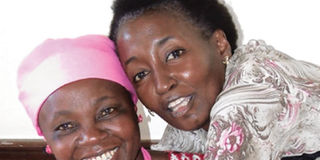Women to auction their hair in aid of cancer survivors

PHOTO | ABEL MOSINGISI Ms Josephine Gichira, right, hugs Ms Margaret Mburu, a breast cancer survivor. Ms Gichira will be cutting off her hair to raise money so that Ms Mburu and others like her can access breast prostheses.
What you need to know:
- During the event, tens of men and women are expected to shave their hair and auction it to guests to raise money to buy prostheses for women who have had mastectomies but cannot afford their own artificial breasts
- A prosthesis costs between Sh15,000 to Sh20,000, while the special bra used with it to give a semblance of real breasts costs on average Sh1,200, a cost which Ms Mburu says is out of reach after one has spent all their money on cancer treatment.
- The hair auction — a first of its kind in Kenya — is modelled after similar auctions held in countries such as the US to raise funds for breast cancer awareness drives and projects
Sitting across a rugged white formica table in her eatery at Ting’ang’a, Kiambu, Margaret Mburu, 59, has a hearty laugh as she talks about her brush with cancer nearly two decades ago, which saw her lose her left breast.
Ms Mburu was lucky to get silicon breast prosthesis from a well-wisher 10 years ago, but before then, she used a ball of cotton wool stuffed in a sock to fill the void where her breast used to be.
Worn out
However, that prosthesis is now worn out and Ms Mburu is one of the women who stands to get a new one from the proceeds of a hair auction that will be held on Wednesday from 2.30pm at the Village Market, Nairobi. Entry is free.
During the event, tens of men and women are expected to shave their hair and auction it to guests to raise money to buy prostheses for women who have had mastectomies but cannot afford their own artificial breasts.
A prosthesis costs between Sh15,000 to Sh20,000, while the special bra used with it to give a semblance of real breasts costs on average Sh1,200, a cost which Ms Mburu says is out of reach after one has spent all their money on cancer treatment.
Ms Mburu now wears her 10-year-old artificial breast for special occasions, and settles for a sock stuffed with pieces of cloth or cotton wool on other days.
“My work involves bending, and when you have a stuffed sock in place, chances are that it will shift and look awkward or fall out and embarrass you. The silicon prosthesis frees you from the fear of an embarrassing moment because it feels and fits just like a real breast,” she said.
Ms Mburu knows women who do not attend social events because they are afraid people may notice that they are walking around with only one breast and a makeshift masquerade on the other side.
“It becomes like an illness because you feel so self-conscious and no matter what you try to do to drive attention away from your bust — wearing a sweater, or draping a shawl around the chest — nothing helps ease that feeling of incompleteness,” she said.
While she has learned to make do with one makeshift breast and live her life, Ms Mburu appreciates the difference a prosthesis makes during her special occasions like mass on Sundays and her monthly support group meetings at a Nairobi hospital.
In another part of the country, IT consultant Josephine Gichira, 49, is bracing herself to have her hair cut for the auction next Wednesday.
While Ms Gichira sported a bald head for three years from 2008, she started growing her hair last year after her aunt was diagnosed with advanced stomach cancer and had vowed never to chop it off again.
“I had started valuing hair again and I was still undecided about whether to perm or dreadlock it and then this came up.”
Ms Gichira discloses that unlike before when she shaved her hair every fortnight without much thought, this time round she agonised about it, but she sees her final decision to donate her hair for the auction not just as a way of helping cancer survivors get prostheses or as a sign of solidarity with those who lose their hair during chemotherapy, but also as a form of closure following her aunt’s death two months ago.
Her aunt lost her hair after chemotherapy and she always sought Ms Gichira’s affirmation about how she looked.
“My aunt was so proud of her hair and I wish I had cut my hair then and made a wig for her to be buried with,” she says, tugging at her short hair.
“Moreover, if a foreigner can cut their hair for a Kenyan stranger, why can’t I?” she says in reference to a handful of American embassy staff who have also pledged their hair for the auction.
The hair auction — a first of its kind in Kenya — is modelled after similar auctions held in countries such as the US to raise funds for breast cancer awareness drives and projects. Such auctions also provide opportunities to collect human hair for wigs for cancer survivors.
The organisers — the Kenya Cancer Association — are not sure they will get enough hair to make human hair wigs, but they aim to use the funds raised to buy prostheses for a start.
Those who are not willing to cut off all their hair are invited to have a few strands snipped as a sign of solidarity with cancer survivors.




